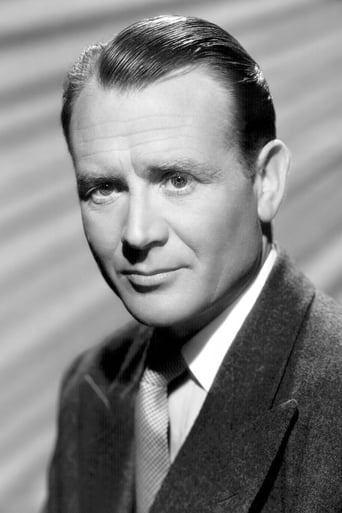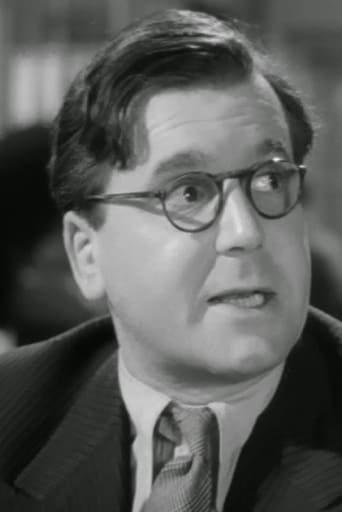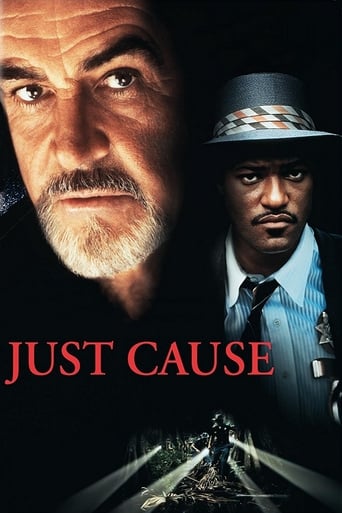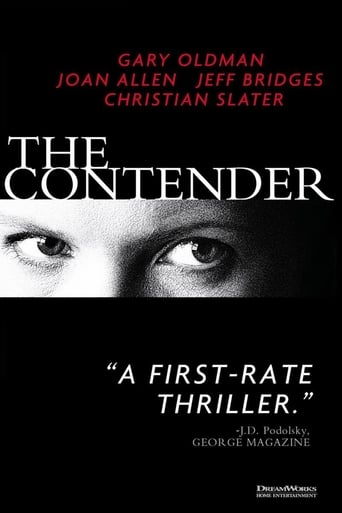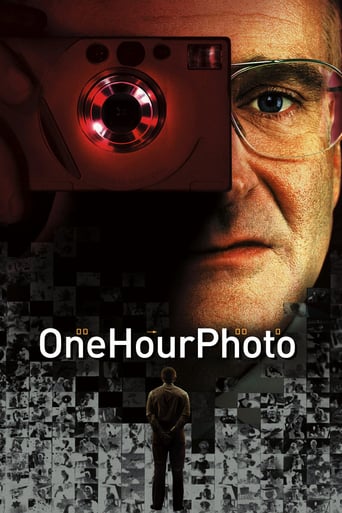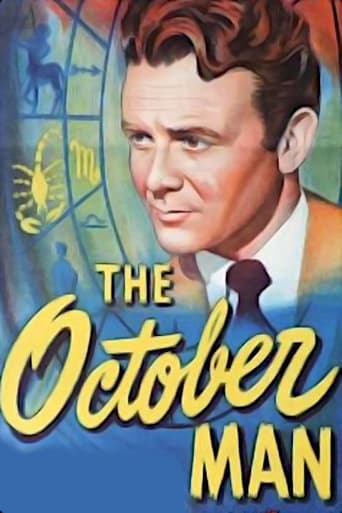
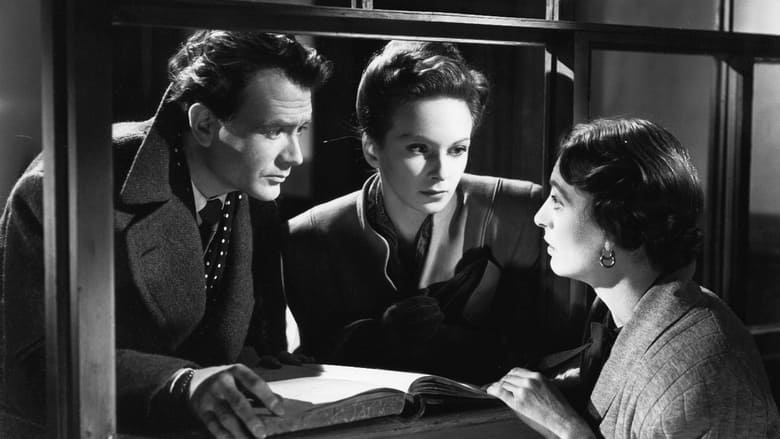
The October Man (1947)
Jim Ackland, who suffers from a head injury sustained in a bus crash, is the chief suspect in a murder hunt, when a girl that he has just met is found dead on the local common, and he has no alibi for the time she was killed.
Watch Trailer
Cast
Similar titles
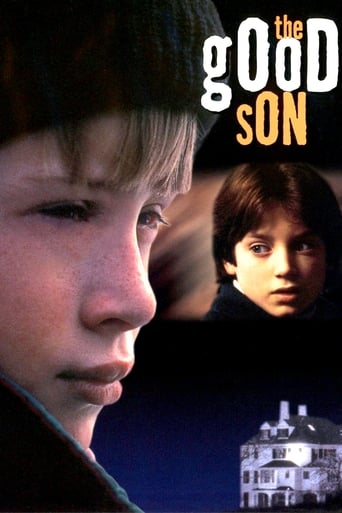
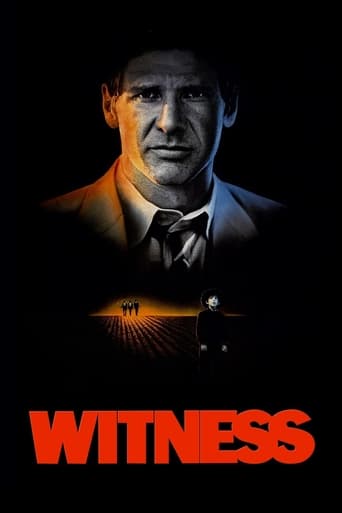
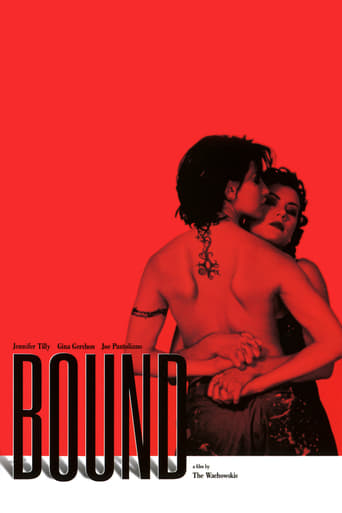
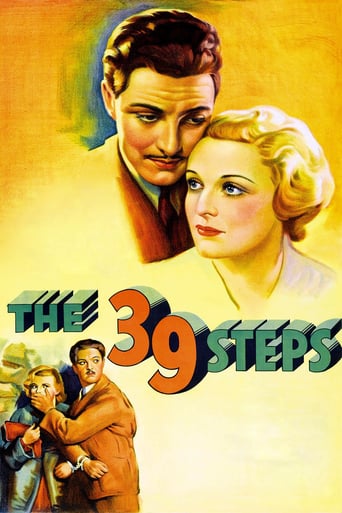
Reviews
Simply Perfect
Easily the biggest piece of Right wing non sense propaganda I ever saw.
There are moments in this movie where the great movie it could've been peek out... They're fleeting, here, but they're worth savoring, and they happen often enough to make it worth your while.
It is an exhilarating, distressing, funny and profound film, with one of the more memorable film scores in years,
....so says Molly (Kay Walsh) to Jim Ackland (John Mills), trying to show some hospitality when he gallantly fixes a fuse. At that moment she couldn't be further from the truth - even though he is getting a second chance at life after spending time in a mental institution, he still blames himself for the death of a little girl (Mill's own daughter Juliette) in his care and life in a typical London boarding house isn't helping. On his first evening he instantly falls foul of a couple of elderly residents when he refuses to sit in for a rubber of bridge.At times he feels suicidal, but time, a steady job at a chemical plant and new friends, including sympathetic and understanding Jenny (beautiful Joan Greenwood) show him that life can be worth living. Even though Bosley Crowther called it "second rate" believe me he didn't know what he was talking about. This is a superlative movie and, I believe, shows John Mills in one of his best performances - he was always at his best depicting decent "everymen" who find circumstances around them spinning out of control. With a screenplay by Eric Ambler, based on his book, you can't expect anything else but excellence.One of the residents, Molly, has a complicated love life. She is in love with a married man, a complete bounder who has no intention of divorcing his wife and is also having to fend off unsavoury advances from a very creepy lodger, Mr. Peachy (Edward Chapman). When her body is found on the common, the movie's pace really picks up. She had turned to Jim for friendship - her confidant exterior masked a lonely girl away from her family. Jim finds through a series of circumstances (fixing the light in her room, giving her some money so she can return to her family) that someone has implicated him as the main suspect and of course the police don't believe him.It doesn't help that the cheque Jim gave her is found crumpled near her body and Jim admits to walking on the common that night. The cinematography is moody and atmospheric. It is always dark and foggy outside the boarding house, with vignettes of residents (helpful, though nosey landlady, querolous older guest, elderly lady forever wanting coal and helpful young man) giving the movie an edge. With no support from the police (they haven't believed him from the start) he finds he has to literally go on the run to prove the police wrong. From then on he is just one jump ahead of the law - there is one exciting scene when he is looking for some "left luggage" at the railway station and needs quick thinking to escape the claustrophobic compartment without bumping into an eager constable.Kay Walsh had already co-starred with John Mills in "This Happy Breed" and "In Which We Serve" and later with films like "Oliver Twist" and "Stage Fright" proved herself a superb character actress. If you ever get a chance to see Adrianne Allen (Joyce Carden) in "The Night of June 13th" (1932) you'll see a really fine performance and also see why she was such a success on the West End.
The October Man (1947)A tightly constructed, well acted, moody, night drenched murder mystery. Very British, very good. Is it amazing? No, but it beats old t.v. hands down. I mean, it's a layered, nuanced, gradually evolving story with some real feeling to it. But it's also a packaged affair, neatly imagined and in the ends not a bit surprising. The romance, at least, is satisfying--the couple seems a good match.Eric Ambler, who wrote and produced, was a high visibility popular author at the time, and you have to assume the movie feels as close to the writer's intentions as possible. Director Roy Ward Baker is only on his second film here, and it shows a natural talent for economy and drama. (He would later direct the Richard Widmark, Marilyn Monroe suspense noir, "Don't Bother to Knock" during a stay in Hollywood.) His most famous film might now be "A Night to Remember" because it was the most complete telling of the Titanic story leading up to Cameron's.In a seemingly British way, the story here is neatly contained. Agatha Christy comes to mind when the main character enters the hotel where most of the action occurs, and we get to know the small number of residents there, each a distinct type. And when the murder (of course) happens, we are led to suspect this person or that. Or at least we are supposed to. The movie makes the perp all too obvious, even before the crime, so you have to depend on how well the story is told instead of being curious who done it.And it's well told indeed. The supporting cast, including the love interest, is competent. The leading man, the falsely accused victim of an earlier bus crash, is rather excellent, played by veteran serious actor John Mills. And all the foggy night scenes, and train and train station sections, ought to make those of you nostalgic for old Britain very happy.
John Mills is the "October Man" in this small 1947 British film costarring Joan Greenwood.Mills plays Jim Ackland, a man involved in a tragic train accident that killed the child of a friend (actually played by Juliet Mills) he was returning to town. He suffers a fractured skull and is hospitalized for a year, as he has developed some brain damage. He blames himself for the accident and is haunted by it. It's actually not clear if he has actual brain damage - he acts perfectly normal and is totally functional - or has developed psychological problems. He leaves the hospital, takes a room at a boarding house and gets a job. His neighbor in the house is a pretty young woman (Joan Greenwood) who apparently is always having money trouble and possibly traded either downright sex or nookies for money with another resident of the house, Mr. Peachy (Edward Chapman). Meanwhile, she's seeing a married man. So one could say her life is complicated. Attempting to break the ties that bind with Mr. not-so-Peachy, she puts the touch on Jim for 30 pounds, and he writes her a check. The next day she's found dead in the Commons, the crumpled check nearby. Suspicion falls on Jim because of the check, the fact that he wasn't home that night she was killed and because of idle gossip started by Mr. Peachey. Meanwhile, Jim has fallen in love with his coworker's sister; though his old terrors return, he realizes that he needs to keep fighting and clear himself of the murder.This is a good movie with a superb performance by John Mills and real British atmosphere which lends itself to the story and bumps up the suspense. As someone correctly stated, it is sort of a film noir but really more psychological in nature, which was all the rage after World War II. Very entertaining.
When a bus crashes due to mechanical failure, industrial chemist Jim Ackland survives but suffers a serious head injury that he has not fully recovered from even when he is discharged from hospital. He goes about his life again despite this and winds up in a small hotel. It is here he meets Molly Newman who asks him for financial help and spends a small amount of time with him. When she is found murdered on the common Ackland has no alibi and everyone seems to believe he was the killer. However with his head injury, even Ackland himself cannot be sure that he didn't do it and the gallows beckon.The basic plot sounded like it would be a cross between the "innocent accused out to clear his name" crossed with the "I've got amnesia could I be the killer?" plot devices and I suppose in essence that is just what it is. In that regard it sounded good but what I wasn't prepared for was the totally lethargic delivery crossed with a terminal lack of tension or pace. The story just plods along and it seems a long amount of time is spent in the build up to put detail in place that is never really used. Even after the murder the whole thing moves forward with very little urgency and it is only in the final ten minutes where you feel like lives are at stake here and that things are urgent. By this time though it is too little too late and the whole thing is sorted out far too easily and tidily.The cast can't do a great deal with the material given all these problems. Mills is a sturdy and reliable lead but he just seems a little disturbed by the accusations and you never believe that he is a man pushed close to the edge. Chapman was a strange find for someone who has seen too many Norman Wisdom films and his presence was not that much of a benefit generally. Support from Greenwood, Walsh, Carey and others is all so-so but in fairness, as with all of them, the material didn't give any of them much to work with.Overall this is a familiar story but it is told with such a sleepy pace that it is hard to have interest in the telling. The cast are left to do the best they can but neither they nor the director can get any pace into the film and I just gradually lost interest to the point where a final ten minutes of dramatic music, running and "races against time" weren't enough to save it.
